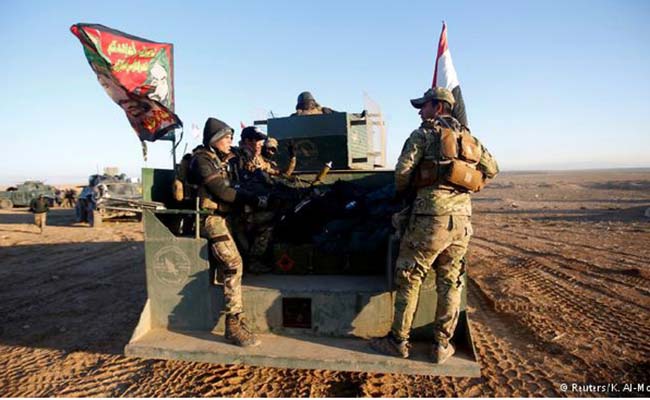“It is my constitutional duty to work for the benefit of the citizens, and to protect our national unity that came under threat of fragmentation as a result of the referendum that was organized by the Kurdish region,” these words were spoken by Iraqi Prime Minister Haider al-Abadi.
Following the defeat of the self-proclaimed Islamic State of Iraq and the Levant (ISIL), a skirmish broke out between Iraqi federal government and Kurdish Regional Government (KRG) in the wake of a controversial September 25 referendum on Kurdish secession that Baghdad had declared illegal. Federal forces launched a major offensive over two fronts on Monday and took full control of Kirkuk.
Kirkuk is highly significant for both sides. It is said to be one of the two main oil-producing areas of Iraq, believed to have around four percent of the world’s oil resources. Kirkuk lies in a wide zone with an enormously diverse population and has been multilingual for centuries. There were dramatic demographic changes during Kirkuk’s urbanization in the twentieth century, which saw the development of distinct ethnic groups. Kurds, Turkmen, Arabs and Assyrians lay conflicting claims to this zone, and all have their historical accounts and memories to support their claims.
There were also signs of divisions among the Iraqi Kurds’ two dominant factions, the Kurdistan Democratic Party (KDP) and the Patriotic Union of Kurdistan (PUK), just a day after their leaders put on a show of unity by rejecting a demand by Baghdad to cancel the outcome of the referendum as a precondition for talks.
Kurdish Peshmerga forces took control of oil-rich Kirkuk after the Iraqi army fled from a major offensive by the ISIL group in 2014. Since then, there has not been an agreement between the KRG and the federal government in Baghdad about who should control the area – and benefit from its vast oil wealth. Tensions between the two sides have been running especially high since Iraqi Kurds overwhelmingly voted for secession in last month’s referendum.
The tension will be a strong blow to Iraq’s stability and is likely to be brushed with the paint of sectarianism. Perhaps, if an armed conflict between Peshmerga and government forces continue, Iraq will plunge into political turmoil similar to Syria. This conflict will undo Iraq’s victory which was gained in years of battles against the ISIL group. In other words, the strife will pave the ground for terrorist activities and return of ISIL fighters. To view the issue of Syria, ISIL capitalized on its political turbulence and infiltrated Syria to launch a proxy war. Now Syria is stuck in the quagmire of violence and bloodshed and there seems no way to get out of there.
Iraq paid heavy sacrifices in battles against the ISIL group and still suffers from militancy and indiscriminate terrorist attacks. Terrorist fighters, mainly the ISIL, seek to fuel sectarian violence so as to pressurize Iraqi government. The ISIL’s cruel practices towards the Yazidi ethnic minority group reflect their sinister aim of triggering sectarianism. Notwithstanding losing the ground in Iraq, ISIL militants are still searching for a gap between Iraqi state and nation. As soon as the gap emerges, it will be filled by militants. So, both Iraqi government and KRG must be cautious enough not to let a rift emerges between them.
The second point is that following the fall of dictatorial regime of Saddam Hussein, Iraq changed into a democratic state with elected president and representatives and constitution. Based on Iraqi’s constitution, Iraq is an indivisible state and no individual, including the Kurdish forces, is allowed to claim independence from the central government. Hence, the referendum for fragmentation is against the Constitution and will be a punishable act.
In this critical point, unity is a dire need for Iraqi nation and state. To protect their victory, they have to do their best to stand an iron fist against their common enemies namely terrorist fighters. Any act which put their unity under question will be put an adverse effect on that country.
Home » Opinion » Tension Resurfaces in Iraq
Tension Resurfaces in Iraq
| Hujjatullah Zia

